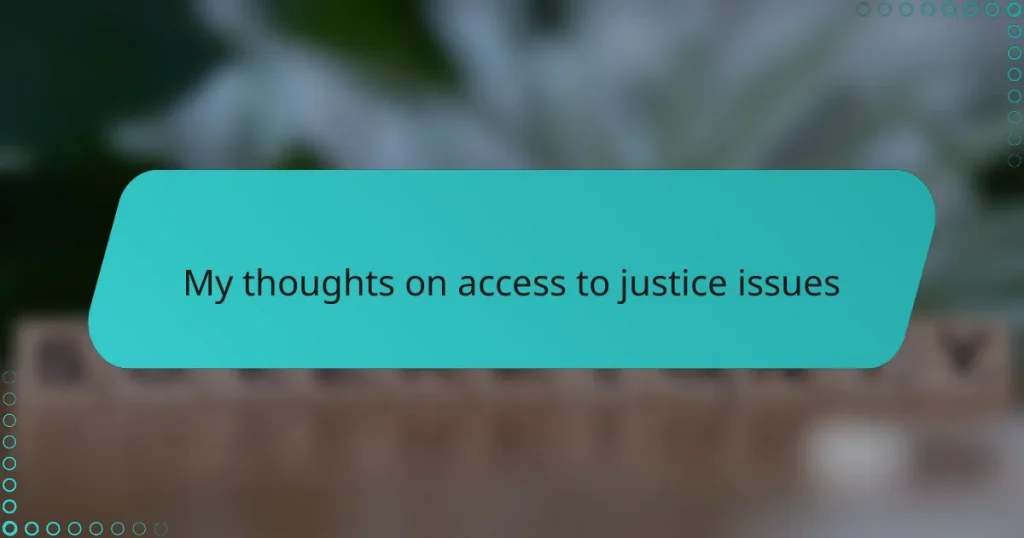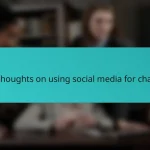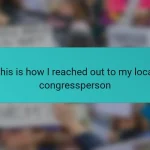Key takeaways
- Access to justice is hindered by financial barriers, complex legal systems, and emotional fears, making it essential to simplify procedures and promote understanding.
- Legal advocacy bridges gaps, providing essential support and driving reforms to make the system more equitable for all individuals.
- Effective advocacy relies on empathy, clear communication, and persistence, which can transform clients’ experiences and empower them to pursue their rights.
- Barriers such as lack of resources and societal stigma can deter individuals from seeking legal help, highlighting the need for increased support and awareness.
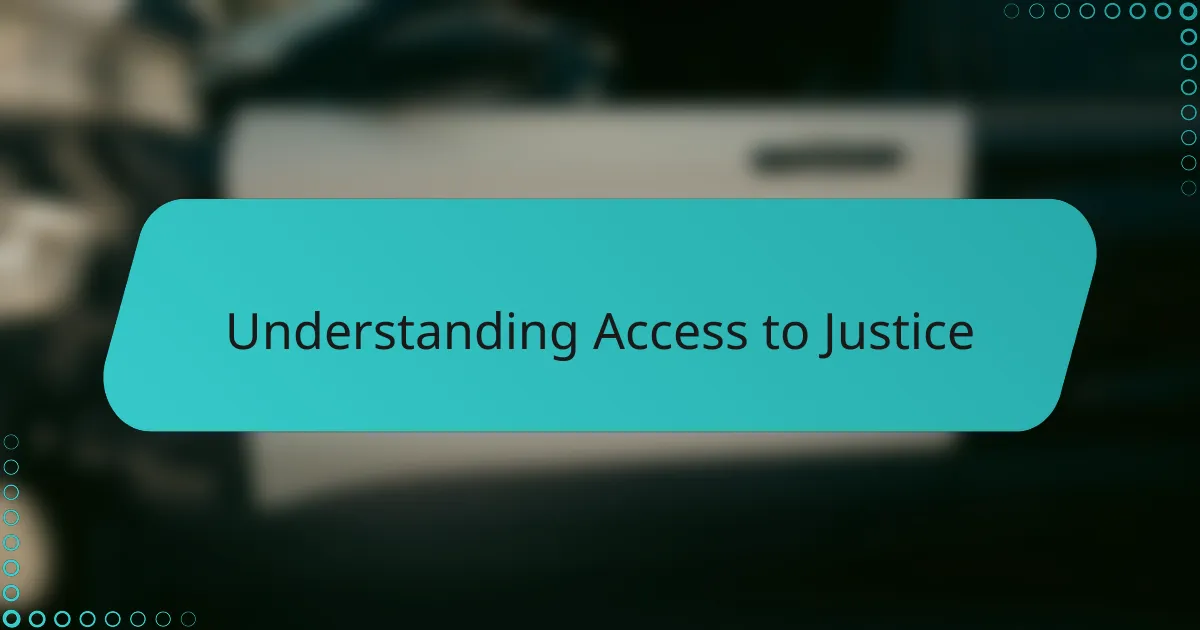
Understanding Access to Justice
Access to justice, to me, is more than just a legal principle—it’s about fairness and dignity. I often wonder, how can justice truly exist if people can’t reach it because of financial or systemic barriers? From my experience, the frustration of watching someone give up because the system feels too complicated is truly disheartening.
Thinking about it further, access to justice means removing obstacles that keep everyday people from understanding or using their rights. I’ve seen firsthand how confusing legal language and costly procedures can discourage people from seeking help. Isn’t it heartbreaking that justice, which should be a universal right, feels like an exclusive privilege for many?
When I reflect on cases I’ve handled, the emotional toll on individuals denied access resonates deeply. It’s not just about laws or courts; it’s about real lives impacted by gaps in the system. What if we all had an equal chance to be heard, to be understood, and to find solutions? That, to me, is the heart of access to justice.
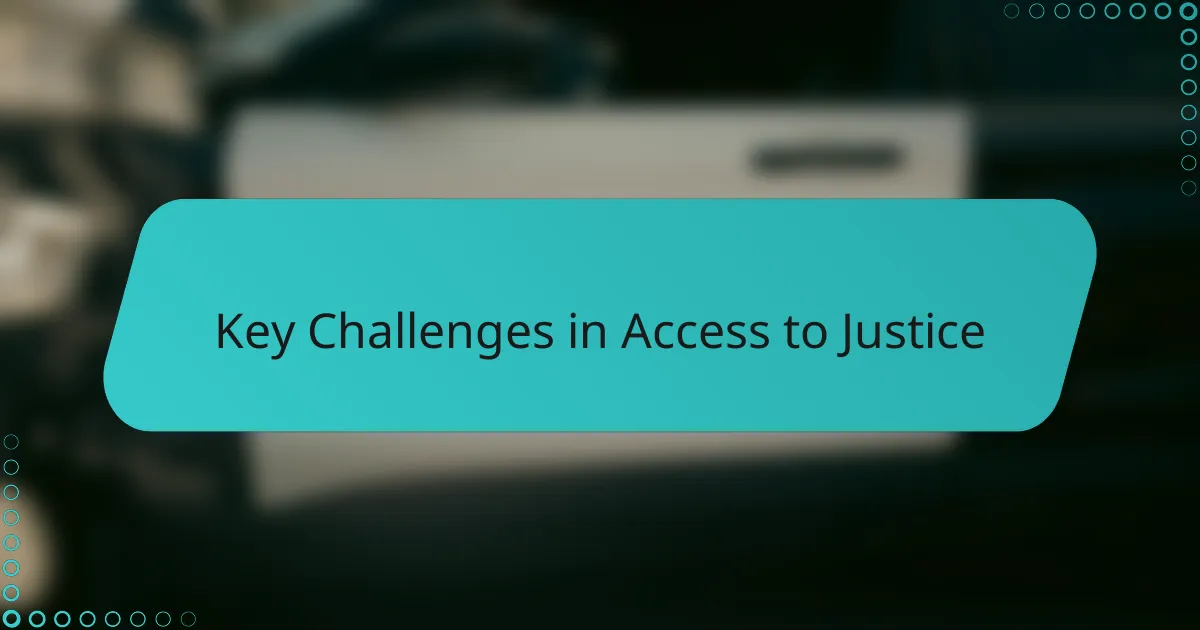
Key Challenges in Access to Justice
One of the biggest hurdles I’ve noticed is the sheer cost of legal services. It pains me to see people with legitimate claims turn away simply because they can’t afford lawyer fees or court costs. How can a system claim to be just when money often dictates who gets a fair hearing?
Another challenge is the complexity of the legal system itself. I’ve worked with clients who feel lost in a maze of forms, jargon, and procedures that seem designed to confuse rather than help. Isn’t it ironic that tools meant to protect can push people further away from justice?
Finally, there’s the emotional barrier that comes with facing the law. From my experience, fear and mistrust often hold people back from seeking help. I ask myself, how many stories have we missed because someone was too intimidated or felt their voice didn’t matter? These are the real challenges that call for urgent attention.
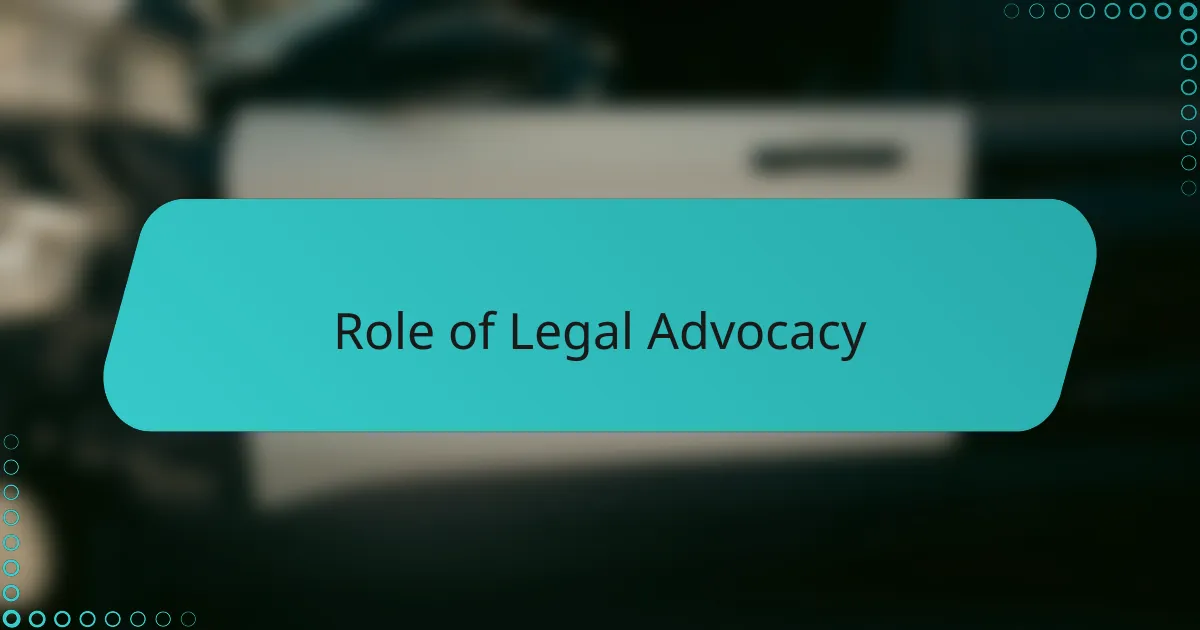
Role of Legal Advocacy
Legal advocacy plays a crucial role in bridging the gap between the law and those who need it most. I’ve often seen how passionate advocates can transform a seemingly impossible case into a story of hope simply by guiding clients through the complexities of the system. Without advocacy, many people would remain voiceless in a process that’s already intimidating on its own.
What strikes me most is how advocates don’t just provide legal representation; they offer emotional support and reassurance during moments of extreme vulnerability. From my experience, their presence can be the difference between someone giving up and someone finding the strength to fight for their rights. It’s more than just legal work—it’s about restoring faith in justice.
I’ve also witnessed advocates challenge systemic barriers, pushing for reforms that make access more equitable over time. Isn’t it inspiring to think that through relentless advocacy, the legal system can evolve to serve everyone more fairly? This ongoing effort fuels my belief that access to justice is achievable, but only if we keep fighting for it.
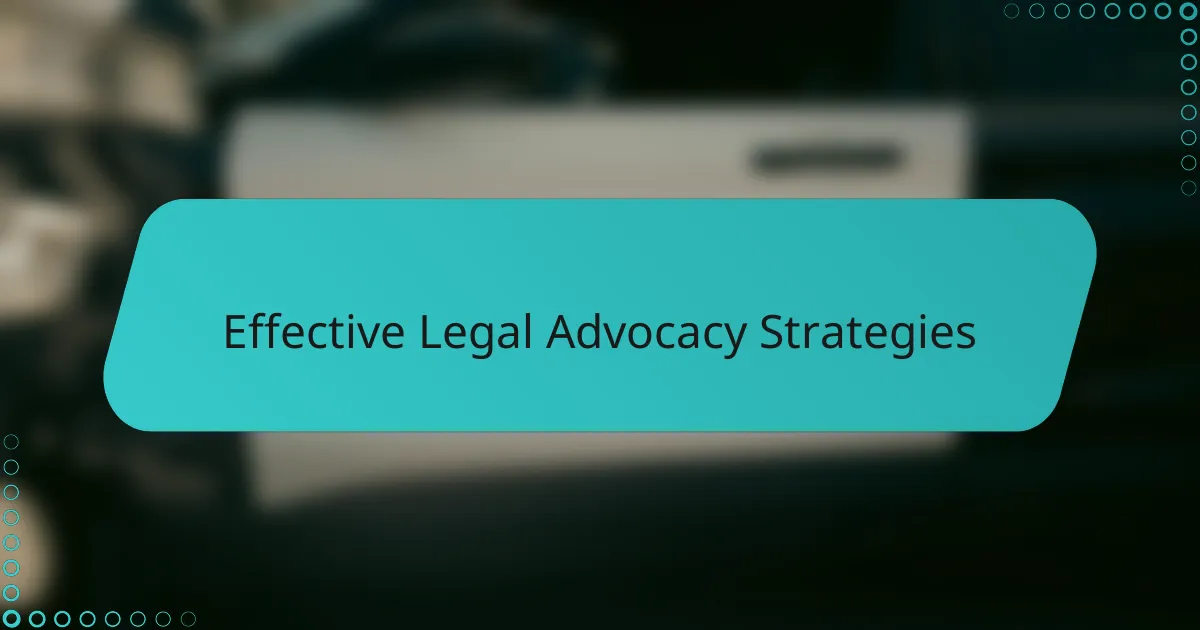
Effective Legal Advocacy Strategies
Effective legal advocacy, in my view, hinges on truly listening to the client’s story. I remember a case where taking the time to understand not just the facts, but the emotions behind them, made all the difference in crafting a compelling argument. Have you ever noticed how empathy can open doors in ways that legal knowledge alone cannot?
Another strategy I rely on is simplifying the legal process. Breaking down complex jargon and procedures into clear, relatable steps helps clients feel empowered rather than overwhelmed. From experience, when people grasp what’s happening, they’re more likely to engage fully and persist through challenges.
Finally, perseverance is at the core of successful advocacy. I’ve seen how consistent follow-up and refusing to accept initial setbacks can turn a losing case into a victory. Isn’t it worth fighting for every chance to level the playing field, no matter how tough the opposition?
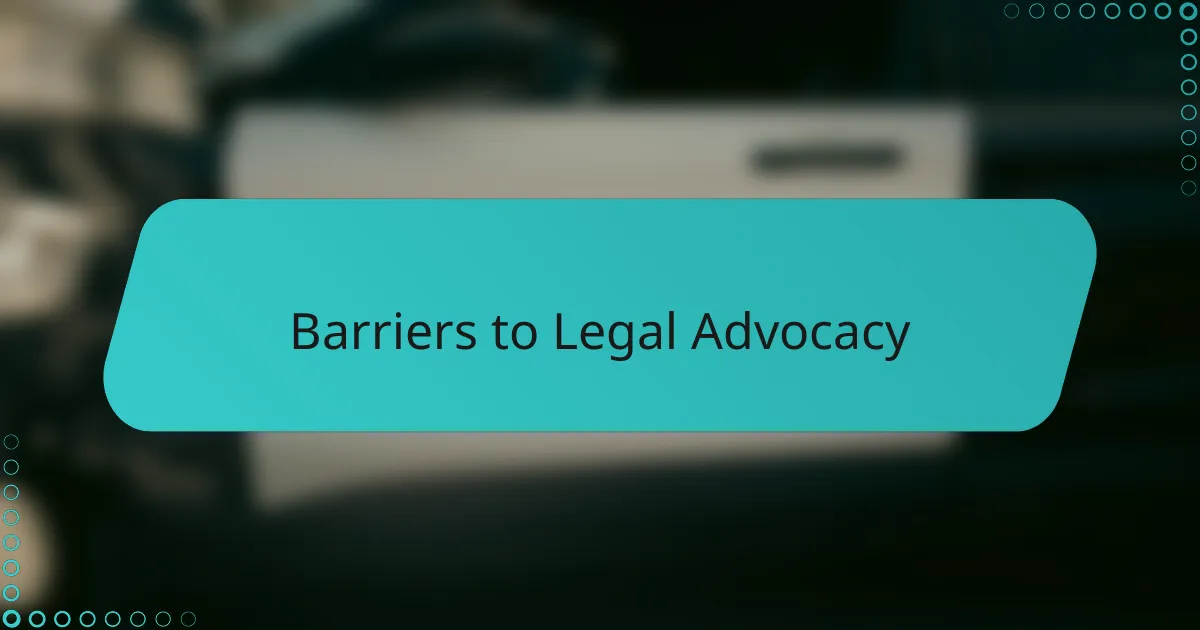
Barriers to Legal Advocacy
One barrier that stands out to me is the sheer lack of resources available for legal advocacy. I’ve witnessed promising cases stall simply because funding wasn’t there to support thorough representation or community outreach. How can we expect justice to thrive when advocacy efforts are stretched so thin?
Then there’s the challenge of navigating bureaucratic red tape. I recall a client who spent months just trying to file the right paperwork, only to be met with more delays and confusing requirements. It made me wonder—how many people give up before even reaching the starting line because the system feels impenetrable?
Lastly, the stigma around asking for legal help often goes unnoticed but is deeply real. From my experience, some clients hesitate to seek advocacy because they fear judgment or feel ashamed of their situation. Isn’t it tragic that pride or fear can be as formidable a barrier as any legal obstacle?
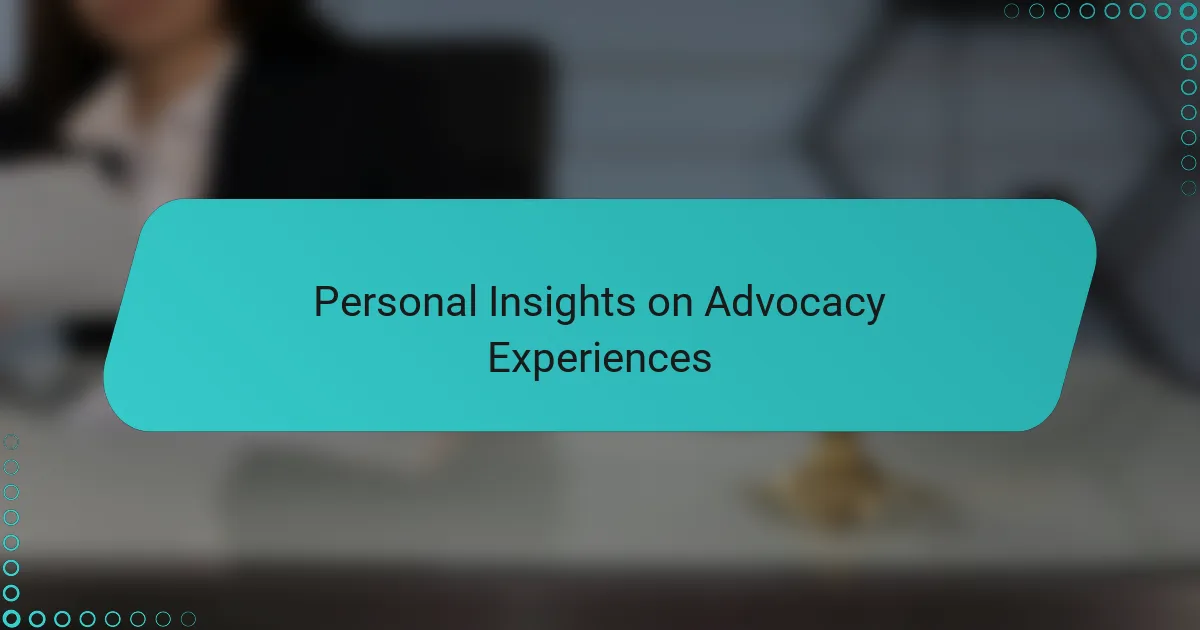
Personal Insights on Advocacy Experiences
One experience that stays with me vividly is working with a single mother overwhelmed by eviction notices. Navigating the maze of deadlines and paperwork felt impossible for her until I stepped in to explain each step clearly and offer steady support. Didn’t it teach me that sometimes, advocacy is less about legal expertise and more about being a compassionate guide through chaos?
I’ve also noticed how personal connection can change everything. When clients sense you genuinely care about their story, they open up in ways that reveal crucial details others might miss. Isn’t it fascinating how trust can become the foundation for winning a case as much as the law itself?
At times, I’ve felt the weight of the system pressing down on both advocates and clients. Fighting systemic barriers can be exhausting and emotionally draining, yet those moments reaffirm why advocacy matters so deeply. How often do we pause to appreciate the resilience required to keep pushing for justice, even when the odds feel stacked?
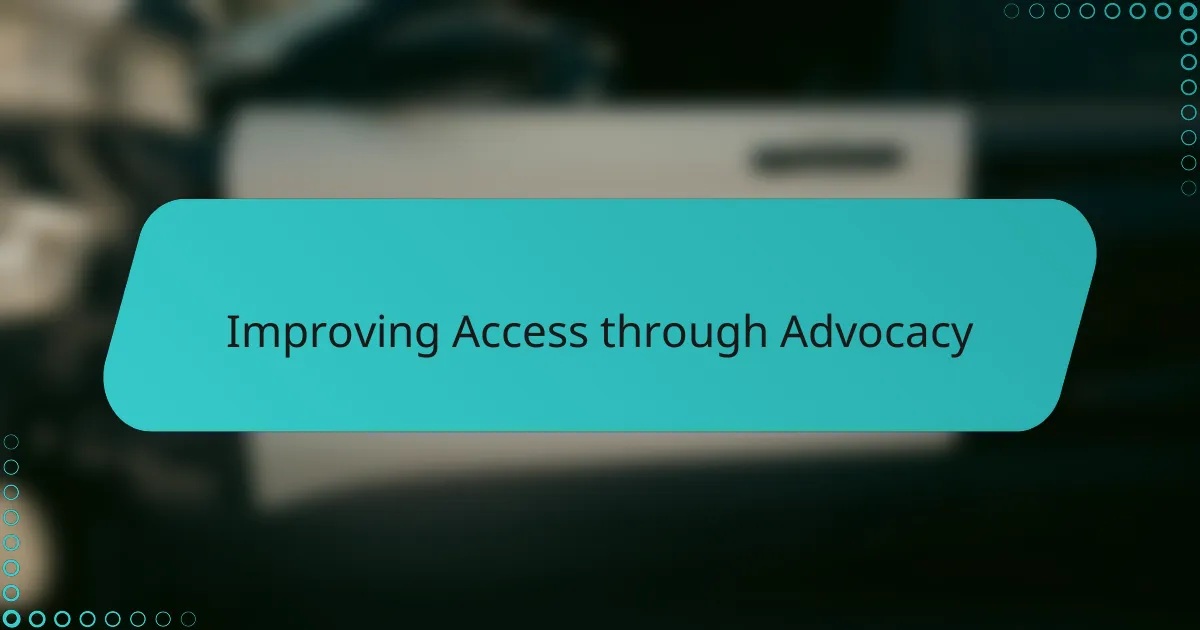
Improving Access through Advocacy
Advocacy, to me, is the lifeline that connects people to justice when the system feels out of reach. I recall a case where a weary client had been turned away by every door she knocked on, but after persistent advocacy, she finally found someone who believed in her—doesn’t that moment of breakthrough remind us why this work matters so much?
What I’ve learned is that effective advocacy isn’t just about filing papers or arguing in court; it’s about being a steadfast ally who makes the legal world less intimidating. When clients see an advocate who listens patiently and speaks their language, it’s like handing them a key to unlock their own path forward. Can you imagine how empowering that feels for someone who once felt invisible?
At the same time, advocacy can pressure the system to change. I’ve witnessed advocates challenge outdated rules that exclude vulnerable voices, which gives me hope that sustained efforts can reshape access to justice for the better. If enough of us keep pushing, how long before these barriers crumble entirely?
